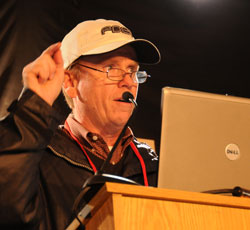 Hydrogen is the fuel of choice at the non-profit HHO Games & Exposition this coming Tuesday, Nov. 11th at the Manatee County Fairgrounds, in Palmetto, Fla.
Hydrogen is the fuel of choice at the non-profit HHO Games & Exposition this coming Tuesday, Nov. 11th at the Manatee County Fairgrounds, in Palmetto, Fla.
This press release says inventors will be testing hydrogen-powered devices for cars, trucks, boats, campers, motorcycles and generators during the four-day round of seminars and the world’s first large-scale display of water-powered vehicles:
“The Games are a national Veterans Day effort to reduce dependence on foreign fuel and save U.S. soldiers who fight and die to secure the nation’s oil lifeline to the Middle East,” organizer Joe Shea said. “We hope to reduce hunger and suffering tied to the high cost of fuel.”
“Thousands of construction jobs have been lost, and three local banks in the country have collapsed in the region’s housing meltdown, he said. With hydrogen a national cottage industry can be created to quickly convert gas-guzzlers to gas-savers with hydrogen kits.
The event would mark a significant transition in public acceptance of hybrid fuels. The attraction is the low-cost, low-tech nature of the kits, substantial gas savings and rapid engine-performance improvement. They are safe because no gas is stored in the kits, which only produce hydrogen on demand for instant use with gas or diesel fuel.
Inventors and thousands of the simply curious will attend seminars by people like ZeroFossilFuels, a Connecticut man, or Nevada-based SmartScarecrow, who have independently produced hundreds of the more than 17,300 videos on YouTube showing a year-long process of building, testing, installing and using HHO kits the size of a small blender. With that vast cross-pollination of ideas, innovations occur almost daily.
You can find out more at the games web site: hhogames.com.
 Former Secretary of Agriculture John Block recently was named to the board of directors for California-based potential cellulosic ethanol company AE Biofuels, Inc.
Former Secretary of Agriculture John Block recently was named to the board of directors for California-based potential cellulosic ethanol company AE Biofuels, Inc. “AE Biofuels has a winning strategy and a strong management team. The company’s patent-pending cellulosic ethanol plant in Montana is producing ethanol from agricultural waste, and its 50 million gallon biodiesel facility in India is supplying large customers in a rapidly growing local and global market,” said Secretary Block.
“AE Biofuels has a winning strategy and a strong management team. The company’s patent-pending cellulosic ethanol plant in Montana is producing ethanol from agricultural waste, and its 50 million gallon biodiesel facility in India is supplying large customers in a rapidly growing local and global market,” said Secretary Block.

 When it comes to harvesting equipment for
When it comes to harvesting equipment for  The Director of Business Development for POET is Scott Weishaar. He was the guy who told us about the various equipment options on display at their
The Director of Business Development for POET is Scott Weishaar. He was the guy who told us about the various equipment options on display at their  Someone had to provide assistance to get all this big machinery to the POET Project LIBERTY field day last week. That someone was
Someone had to provide assistance to get all this big machinery to the POET Project LIBERTY field day last week. That someone was  Alternative fuels might be getting a boost as a major fuel retailer will help make propane more available.
Alternative fuels might be getting a boost as a major fuel retailer will help make propane more available. Iowa-based Renewable Energy Group (REG) has announced the availability of their brand of biodiesel at a large-volume biodiesel terminal in Ogden, Utah.
Iowa-based Renewable Energy Group (REG) has announced the availability of their brand of biodiesel at a large-volume biodiesel terminal in Ogden, Utah. Hydrogen is the fuel of choice at the non-profit HHO Games & Exposition this coming Tuesday, Nov. 11th at the Manatee County Fairgrounds, in Palmetto, Fla.
Hydrogen is the fuel of choice at the non-profit HHO Games & Exposition this coming Tuesday, Nov. 11th at the Manatee County Fairgrounds, in Palmetto, Fla. When you’re attending a farm event it’s always nice to get a farmer’s perspective on things. That’s what I did at the POET
When you’re attending a farm event it’s always nice to get a farmer’s perspective on things. That’s what I did at the POET  The executive director of the
The executive director of the  The Director of
The Director of